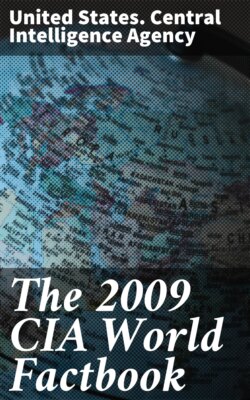Читать книгу The 2009 CIA World Factbook - United States. Central Intelligence Agency - Страница 72
На сайте Литреса книга снята с продажи.
NA
ОглавлениеNationality:
noun: Albanian(s)
adjective: Albanian
Ethnic groups:
Albanian 95%, Greek 3%, other 2% (Vlach, Roma (Gypsy), Serb,
Macedonian, Bulgarian) (1989 est.)
note: in 1989, other estimates of the Greek population ranged from 1% (official Albanian statistics) to 12% (from a Greek organization)
Religions:
Muslim 70%, Albanian Orthodox 20%, Roman Catholic 10%
note: percentages are estimates; there are no available current statistics on religious affiliation; all mosques and churches were closed in 1967 and religious observances prohibited; in November 1990, Albania began allowing private religious practice
Languages:
Albanian (official - derived from Tosk dialect), Greek, Vlach,
Romani, Slavic dialects
Literacy:
definition: age 9 and over can read and write
total population: 98.7%
male: 99.2%
female: 98.3% (2001 census)
School life expectancy (primary to tertiary education):
total: 11 years
male: 11 years
female: 11 years (2004)
Education expenditures:
2.9% of GDP (2002) country comparison to the world: 147
Government ::Albania
Country name:
conventional long form: Republic of Albania
conventional short form: Albania
local long form: Republika e Shqiperise
local short form: Shqiperia
former: People's Socialist Republic of Albania
Government type:
emerging democracy
Capital:
name: Tirana (Tirane)
geographic coordinates: 41 19 N, 19 49 E
time difference: UTC+1 (6 hours ahead of Washington, DC during Standard Time)
daylight saving time: +1hr, begins last Sunday in March; ends last Sunday in October
Administrative divisions:
12 counties (qarqe, singular - qark); Berat, Diber, Durres, Elbasan, Fier, Gjirokaster, Korce, Kukes, Lezhe, Shkoder, Tirane, Vlore
Independence:
28 November 1912 (from the Ottoman Empire)
National holiday:
Independence Day, 28 November (1912)
Constitution:
approved by parliament on 21 October 1998; adopted by popular referendum on 22 November 1998; promulgated 28 November 1998
Legal system:
has a civil law system; has not accepted compulsory ICJ jurisdiction; has accepted jurisdiction of the International Criminal Court for its citizens
Suffrage:
18 years of age; universal
Executive branch:
chief of state: President of the Republic Bamir TOPI (since 24 July 2007)
head of government: Prime Minister Sali BERISHA (since 10 September 2005)
cabinet: Council of Ministers proposed by the prime minister, nominated by the president, and approved by parliament
elections: president elected by the Assembly for a five-year term (eligible for a second term); four election rounds held between 8 and 20 July 2007 (next election to be held in 2012); prime minister appointed by the president
election results: Bamir TOPI elected president; Assembly vote, fourth round (three-fifths majority (84 votes) required): Bamir TOPI 85 votes, Neritan CEKA 5 votes
Legislative branch:
unicameral Assembly or Kuvendi (140 seats; 100 members elected by direct popular vote and 40 by proportional vote to serve four-year terms)
elections: last held 3 July 2005 (next to be held in 2009)
election results: percent of vote by party - NA; seats by party - PD 56, PS 42, PR 11, PSD 7, LSI 5, other 19
note: Parliament in November 2008 approved an electoral reform package that will transform the electoral system from a majority system to a regional proportional system; the code will also establish an electoral threshold limiting smaller party representation
Judicial branch:
Constitutional Court, Supreme Court (chairman is elected by the People's Assembly for a four-year term) and multiple appeals and district courts
Political parties and leaders:
Agrarian Environmentalist Party or PAA [Lufter XHUVELI]; Christian
Democratic Party or PDK [Nard NDOKA]; Communist Party of Albania or
PKSH [Hysni MILLOSHI]; Democratic Alliance Party or AD [Neritan
CEKA]; Democratic Party or PD [Sali BERISHA]; G99 Political Movement
[Erion VELIAJ]; Liberal Union Party or BLD [Arjan STAROVA]; National
Front Party (Balli Kombetar) or PBK [Artur ROSHI]; New Democratic
Party or PDR [Genc POLLO]; Republican Party or PR [Fatmir MEDIU];
Social Democracy Party of Albania or PDSSh [Paskal MILO]; Social
Democratic Party or PSD [Skender GJINUSHI]; Socialist Movement for
Integration or LSI [Ilir META]; Socialist Party or PS [Edi RAMA];
Socialist Party 1991 [Petro KOCI]; Union for Human Rights Party or
PBDNj [Vangjel DULE]
Political pressure groups and leaders:
Citizens Advocacy Office [Kreshnik SPAHIU]; Confederation of Trade
Unions of Albania or KSSH [Kastriot MUCO]; Front for Albanian
National Unification or FBKSH [Gafur ADILI]; Mjaft Movement; Omonia
[Jani JANI]; Union of Independent Trade Unions of Albania or BSPSH
[Gezim KALAJA]
International organization participation:
BSEC, CE, CEI, EAPC, EBRD, FAO, IAEA, IBRD, ICAO, ICCt, ICRM, IDA,
IDB, IFAD, IFC, IFRCS, ILO, IMF, IMO, Interpol, IOC, IOM, IPU, ISO
(correspondent), ITU, ITUC, MIGA, NATO, OIC, OIF, OPCW, OSCE, SECI,
UN, UNCTAD, UNESCO, UNIDO, UNOMIG, UNWTO, UPU, WCO, WFTU, WHO, WIPO,
WMO, WTO
Diplomatic representation in the US:
chief of mission: Ambassador Aleksander SALLABANDA
chancery: 2100 S Street NW, Washington, DC 20008
telephone: [1] (202) 223–4942
